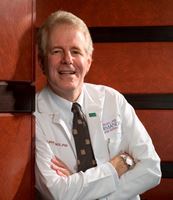
The Wayne State University School of Medicine, in partnership with the Barbara Ann Karmanos Cancer Institute, is one of the lead academic centers participating in the National Cancer Institute's Molecular Analysis for Therapy Choice, or MATCH Trial, in the United States, set to begin in the next few weeks.
Of the more than 2,000 National Cancer Trial Network or NCI Community Oncology Research Program sites participating in the MATCH Trial, only 30 are lead academic centers. The NCI MATCH Trial is an example of President Barack Obama's Precision Medicine Initiative, focusing on treating cancer patients based on the molecular profile of their tumors.
Anthony Shields, M.D., Ph.D., professor of Medicine and Oncology for the WSU School of Medicine, and associate center director of Clinical Sciences and program leader for Molecular Imaging at Karmanos, will serve as the local principal investigator of the NCI MATCH Trial. Dr. Shields is also a member of the Eastern Cooperative Oncology Group and the American College of Radiology Imaging Network Cancer Research Group, which is leading the nationwide NCI-MATCH Trial.
"Karmanos Cancer Institute is known for its extensive clinical trials and research programs," Dr. Shields said. "Treating patients with targeted therapies looking at the molecular makeup of certain tumors is something we've been doing, but we will now be able to take it to an even greater level with the NCI MATCH Trial. With so many medical centers participating in this trial, it will provide a greater number of potential candidates with specific gene mutations to test novel therapies that could ultimately lead to finding improved treatment options for cancer patients."
The NCI Match Trial, which is a phase II trial, seeks to determine whether targeted therapies for people whose tumors have specific gene mutations will be effective, regardless of their cancer type. For instance, a breast cancer patient may have the Anaplastic lymphoma kinase, or ALK, gene mutation often found in lung cancer. The NCI MATCH Trial sub-study will look at treating the ALK mutation rather than the type of cancer. More than 20 different study drugs or drug combinations, each targeting a certain gene mutation, will be incorporated in the NCI MATCH Trial as treatment sub-studies. The NCI plans to open the MATCH Trial with 10 sub-studies, eventually moving to about 20 or more. Each sub-study will analyze a treatment being investigated for a particular gene mutation, providing more opportunities for potential life-saving treatments.
Trial investigators plan to conduct a genetic scan on approximately 3,000 patients nationwide during the course of the NCI MATCH Trial. If a molecular abnormality is detected in a patient and there is a corresponding sub-study addressing that abnormality, the patient will go through further evaluation to determine whether they are a candidate for the MATCH Trial. The goal is to enroll about 1,000 patients in various treatment sub-studies. Large numbers of cancer patients' molecular profiles are needed because each of the targeted gene mutations occur in 10 percent or less of cancer patients and there needs to be enough patients to show adequate trial results.
The overall goals for the NCI MATCH Trial are to have the response rate in proportion of the patients in the trial whose tumors shrink by a predefined amount over a specific time period, and to achieve a six-month, progression-free survival, a measurement of whether a patient's disease remains stable.
"Although we have made great progress in cancer research, continued funding and collaboration is critical for the development of new cancer treatments, such as the molecular-targeted treatments, especially as cancer cells become resistant to current therapies," Dr. Shields said. "This is a major step in the future of cancer care."
Trial participants must be at least 18 years old, with solid tumors or lymphomas that have advanced following at least one type of standard treatment, or have tumors for which there is no standard treatment. Each sub-trial will enroll up to 35 patients. Those with rare types of cancer are also encouraged to participate.
The trial will cover the cost of the new tumor biopsy, which is required in the study to test for the gene mutations. The treatment drugs may also be provided by the study. The participants' insurance will be billed for clinical visits, laboratory tests and scans that are part of routine care.
The WSU-Karmanos site is one of four participating in the NCI MATCH Trial in the metropolitan Detroit area and is one of the sites with the highest number of minority patients.
For more information on the MATCH Trial, call 1-800-KARMANOS or 1-800-527-6266.
This grant was funded by the National Cancer Institute of the National Institutes of Health, grant EAY131.